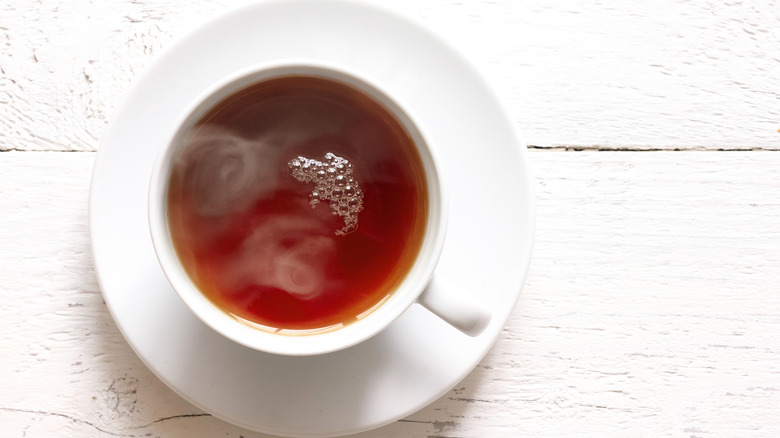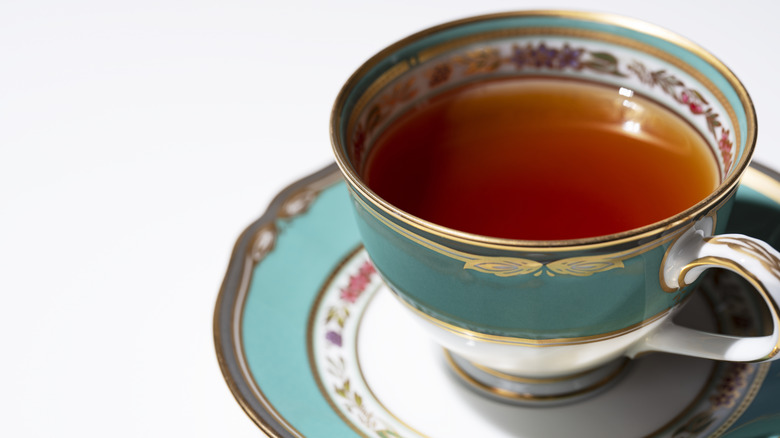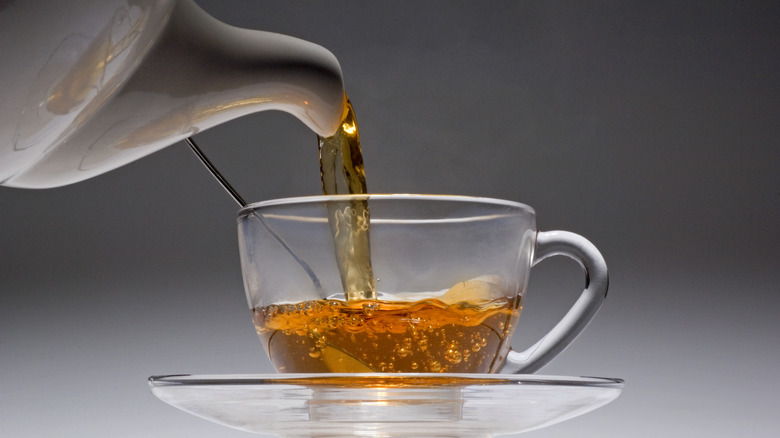Does Adding Salt To Tea Actually Make It Taste Better?
When it comes to food, most things are a matter of personal taste (ha). But in some cases, you just can't argue with science — though the British may disagree.
An American scientist sparked controversy in early 2024 when she wrote a book, "Steeped: The Chemistry of Tea," which made a suggestion that some deemed to be sacrilege: adding salt to tea. British media responded in horror to the suggested adulteration, and the American Embassy in London issued a tongue-in-cheek statement on X, formerly known as Twitter, assuring Brits that "the unthinkable notion of adding salt to Britain's national drink is not official United States policy. And never will be."
The idea to add salt to tea didn't just fall out of the sky — the suggestion was actually found in ancient Chinese texts — but the author, Michelle Francl, PhD, a professor of chemistry at Bryn Mawr College, explained that there's a scientific reason why adding salt to tea improves the taste. When added to tea in very small amounts — too small to be able to taste saltiness — it mellows out the bitter edge by blocking taste receptors on our tongues and thus making us less sensitive to the bitterness. Basically, one flavor cancels out the other.
Bitter isn't always better
There are lots of drinks in which we appreciate bitterness, tea being among them, as well as coffee, beer, and wine. But sometimes, even folks who generally like bitterness can find a beverage to be excessively so, and in those cases, feel that the bitterness could use some taming.
Around the world, it's actually fairly commonplace to add salt to bitter beverages like beer (and goses, a style of beer that dates back to medieval Germany and has in recent years come back into fashion, actually includes salt in the brewing process). Even before Dr. Francl confirmed it scientifically, it's long been folk knowledge that salt can quell bitterness when added to drinks in small amounts. It's also been scientifically established that salt can enhance the other flavors present, like sweetness, without making itself noticeable. It's the same reason we often add a pinch of salt when making sweets. In tea, the sodium prevents us from sensing the bitterness as strongly, and it amps up other flavor notes like sweetness, herbaceousness, nuttiness, or whatever it may be.
Don't get salty
If you're someone who's very health-conscious, you might be wondering if the added sodium might have any effects on your body. As the London-based nutritionist Jo Travers, BSc, R.D. told Healthnews, there aren't major health risks (nor benefits) associated with using salt in such a small quantity, though she did caution that if you're someone who drinks several cups of tea a day, those pinches of salt can start to add up. Additionally, given that many people already ingest far more sodium than doctors recommend, Travers expressed wariness about giving people one more thing to salt. If you're on a strict low-sodium diet, you may just need to take the bitterness as it comes. (Or add milk and sugar.)
Of course, the question of whether that bitterness needs to be cut is completely subjective. For some, those aggressive, tannic flavors are perfect as they are, no smoothing-out necessary. But if that's not the case for you, take a page from ancient Chinese tea practices and try sprinkling in just a little pinch of salt. Just make sure no tea purists are watching you.


